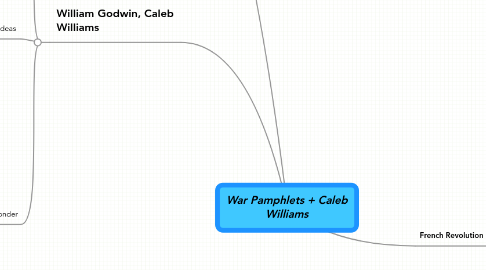
1. Effects of French Revolution on Britain
1.1. Pro Revolution
1.1.1. House of Hanover (1714 – 1901) – criticized for its lack of understanding of the British people
1.1.1.1. Laws tweaked and twisted to ensure the sustenance of those in power
1.1.1.1.1. Political repression Trial In Absentia Seditious libel Legislation that redefined the law of treason
1.1.2. Thomas Paine, Rights of Man (1791)
1.1.2.1. “Paine scoffs at the sacred topics of conservatism – monarchy, aristocracy, church, constitution." “Healthy individual’s independence” “Redistribution of the national income from taxation in favor of the poor” Written with “brutal directness”, appeals to reason, to humanity Monarch versus. Representative government
1.1.3. William Godwin, Political Justice (1793)
1.1.3.1. “hostile analysis of aristocratic society, which Godwin sees as upheld by deliberate fraud, or imposition, of the governors upon the governed”
1.1.3.2. “subtler.. And more sustained.. In probing the influence of aristocracy not merely over institutions like Parliament and the Law, but also over ideas and culture.”
1.2. Anti Revolution
1.2.1. The aristocrats, the people who believed in the romantic idea of the monarch
1.2.2. Edmund Burke, Reflections on the revolution in France (1790)
1.2.2.1. - Burke saw the French Revolution as an event that destroyed the very institution that held order - Has the tendency to idolize and romanticize the monarchy and its rule - Saw the French Revolution and their cause as ‘unnatural’ and of a ‘barbarous philosophy
2. William Godwin, Caleb Williams
2.1. Summary
2.1.1. Volume I
2.1.2. Volume II
2.1.3. Volume III
2.2. Ideas
2.2.1. Injustice due to abuse of power
2.2.1.1. - Injustice faced by the poor because of the abuse of power by those rich and powerful Eg: The Hawkins Emily The protagonist - The dungeons and prison itself where we are introduce to more victims of society = If things remain as they are, the persecutor will always be the rich and powerful while the persecuted the poor no matter who was ‘right’ or ‘wrong’ Godwin belief that the solution is too erase all forms of government and institutions
2.2.2. The notion of Freedom
2.2.2.1. - Freedom of the mind vs. suppression of the mind - Caleb vs. Faulkland - Simplicity of Caleb’s thoughts vs. Faulkland’s disturbed state of mind “paroxysm of insanity” “stately coldness and reserve” “mild dejection” - Ideology - “What power is able to hold in chains a mind ardent and determined?”
2.2.3. The individual
2.2.3.1. - The individual becoming more important than a nation itself - Motives - What is it that changes a good honourable man to a vicious one? Is it innate or is it circumstances? - Real truth residing within the individual not the institution
2.2.4. Power Structure
2.2.4.1. - Based on a hereditary system - The law seem to function as something that keeps people in their place rather than bringing about true justice - The power structure – laws, hereditary government, persecutor and the persecuted - Law which is suppose to be blind is not rather it supports the rich and powerful - What do you think laws were made for?- I do nothing but rights and my rights I will have’ –Tyrrel
2.3. Points to ponder
2.3.1. 1. Now that we have democracy, is there really more equality or are our situation not far from that of Caleb Williams ?
2.3.2. 2. Consider the relevance of the deconstruction of the mechanisms of justice in Caleb Williams in today's political context.
